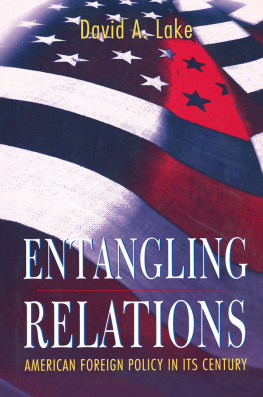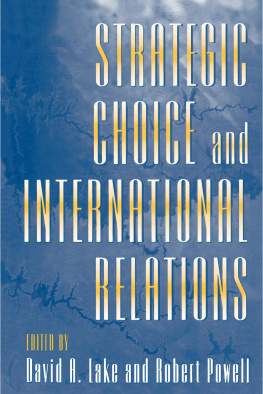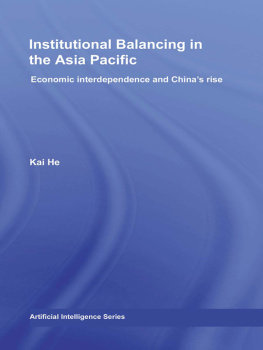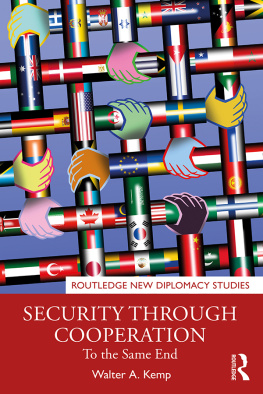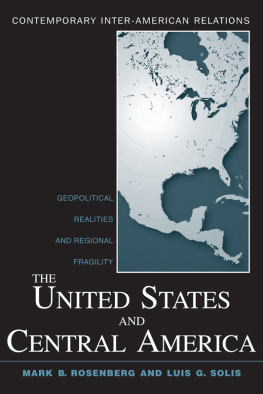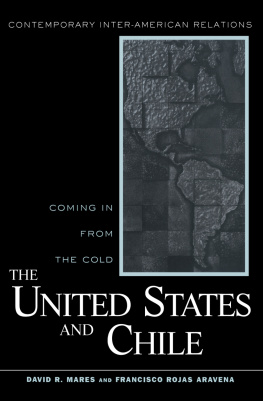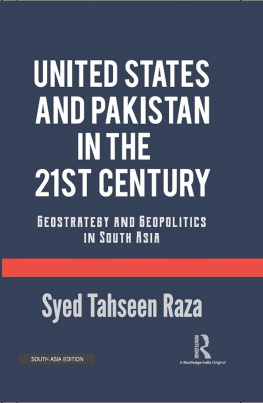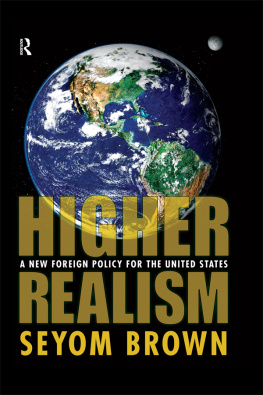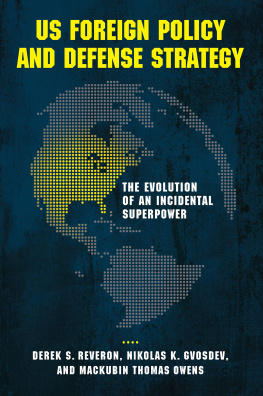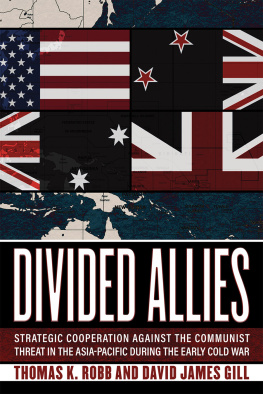Entangling Relations
PRINCETON STUDIES IN INTERNATIONAL HISTORY AND POLITICS
Series Editors
Jack L. Syder and Richard H. Ullman
RECENT TITLES
Entangling Relations: American Foreign Policy in Its Century
by David A. Lake
A Constructed Peace: The Making of the European Settlement,
19451963 by Marc Trachtenberg
Regional Orders at Centurys Dawn: Global and Domestic Influences
on Grand Strategy by Etel Solingen
From Wealth to Power: The Unusual Origins of Americas World Role
by Fareed Zakaria
Changing Course: Ideas, Politics, and the Soviet Withdrawal from
Afghanistan by Sarah E. Mendelson
Disarming Strangers: Nuclear Diplomacy with North Korea
by Leon V Sigal
Imagining War: French and British Military Doctrine between the
Wars by Elizabeth Kier
Roosevelt and the Munich Crisis: A Study of Political Decision-Making
by Barbara Rearden Farnham
Useful Adversaries: Grand Strategy, Domestic Mobilization, and
Sino-American Conflict 19471958 by Thomas J. Christensen
Satellites and Commisars: Strategy and Conflict in the Politics of the
Soviet-Bloc Trade by Randall W. Stone
Does Conquest Pay? The Exploitation of Occupied Industrial Societies
by Peter Liberman
Cultural Realism: Strategic Culture and Grand Strategy in Chinese
History by Alastair Iain Johnston
The Korean War: An International History by William W Stueck
Cooperation among Democracies: The European Influence on U.S.
Foreign Policy by Thomas Risse-Kappen
The Sovereign State and Its Competitors by Hendrik Spruyt
Entangling Relations
AMERICAN FOREIGN POLICY
IN ITS CENTURY
David A. Lake
PRINCETON UNIVERSITY PRESS
PRINCETON, NEW JERSEY
Copyright 1999 by Princeton University Press
Published by Princeton University Press, 41 William Street,
Princeton, New Jersey 08540
In the United Kingdom: Princeton University Press, Chichester, West Sussex
All Rights Reserved
Library of Congress Cataloging-in-Publication Data
Lake, David A., 1956
Entangling relations : American foreign policy in its century /
David A. Lake.
p. cm. (Princeton studies in international history and politics)
Includes bibliographical references (p. ) and index.
I. United StatesForeign relations20th century. 2. National
securityUnited StatesHistory20th century. I. Title.
II. Series.
E744.L27 1999 327.73dc21 9837330 CIP
ISBN 0-691-05990-X (cloth : alk. paper). ISBN 0-691-05991-8
(pbk. : alk. paper)
eISBN: 978-0-691-21611-9
https://press.princeton.edu/
R0
To my parents
FIGURES AND TABLES
FIGURES
TABLES
PREFACE
THIS BOOK has had a long gestation. Stimulated by postmodern and, later, constructivist criticisms of the statist nature of international relations theory, I began to reconsider the patterns and determinants of political authority within the international system. The longer I thought about these issues, the more convinced I became that the critics were rightand wrong. The organization of political authority into separate, sovereign states could not be taken for granted, and the structure of political authority within the international system was an important topic for inquiry. Indeed, once I began to look for it, I saw not a world of homogenous states but a world of rich, complex, and variegated patterns of political authority. I also found that how political authority was organized mattered deeply for foreign policy choices, even in the contemporary era. At the same time, I concluded that explaining these patterns did not require abandoning rationalist, positivist theory.
I wrote the first paper on the ideas that would become this book in 1987. In the years since I have incurred an enormous number of professional and personal debts. I was first introduced to theories of relational contracting at the Tuesday Political Economy lunch at UCLA. This remarkable institution, and the people who composed it between its founding and 1992, did much to shape this book through what we read and argued about and by subjecting several early chapters to the usual thrashing. Jeff Frieden, as always, was both my hardest and most patient critic. At UCSD, Peter Gourevitch has offered insightful guidance.
I am grateful for the constructive advice and even the harsh criticisms I have received from friends, colleagues, and sometimes anonymous participants in seminars around the globe. Richard Betts, Joseph Grieco, Peter Katzenstein, Robert Keohane, Paul Papayoanou, Robert Powell, Jack Snyder, and Stephen Walt read the penultimate draft of the manuscript. Although too many colleagues provided comments and assistance to thank each individually, I want to acknowledge Michael Hiscox, Jeffrey Legro, Andrew Moravcsik, Ronald Rogowski, Richard Rosecrance, Arthur Stein, Michael Tierney, Celeste Wallander, and Beth Yarbrough for especially helpful comments on various chapters. I had many outstanding research assistants on this project, including Risa Brooks, Scott Bruckner, Kathleen Hancock, Steven Lobell, and Adam Stulberg; I am especially grateful to Matt Baum for his assistance on the statistical portion of .
I am pleased to acknowledge the financial assistance of the academic senates at UCLA and UCSD, as well as the Center on International Relations at UCLA. The University of Californias Institute on Global Conflict and Cooperation provided substantial support before, during, and after my tenure as research director. None of these individuals or institutions is responsible for the errors remaining in this book.
Portions of this book appeared in an earlier form as Anarchy, Hierarchy, and the Variety of International Relations, International Organization 50, 1 (Winter 1996): 133; published here with the permission of MIT Press, Cambridge, MA. I am also grateful to Malcolm Litchfield at Princeton University Press for seeing the value in this book, and to Margaret Case for her outstanding copyediting.
I am very grateful to my family for their encouragement over the years. My children, Brenden and Dylan, deserve special thanks. They have lived with this book their entire lives, and have suffered the response Im sorry, I have to work to many requests. I hope one day they experience the joy that comes from the passionate pursuit of ideas. As ever, I am profoundly indebted to my wife, Wendy, for her love and support.
Entangling Relations
Chapter 1
INTRODUCTION
IN HIS FAREWELL ADDRESS to the country he had led through war and its first years of independence, President George Washington warned his fellow citizens against permanent alliances in the conduct of foreign affairs. Why, he asked, by interweaving our destiny with that of any part of Europe, entangle our peace and prosperity in the toils of European ambition, Rivalship, Interest, Humour, or Caprice?
This injunction against foreign entanglements was elevated, over time, into an almost sacred principle of American policy. Repeated in subsequent pronouncements, including the famous Monroe Doctrine, it became the standard against which nearly all foreign policy initiatives were measured. Although it did not stop the United States from expanding across the continent and incorporating new territories into the union, and it did not prevent the countrys hesitant steps toward an overseas empire at the turn of the century, the principle of nonentanglement remained the guiding light of Americas relations with other sovereign powers. Even in World War I, President Woodrow Wilson insisted that the United States fight only as an associated and not an allied power.

